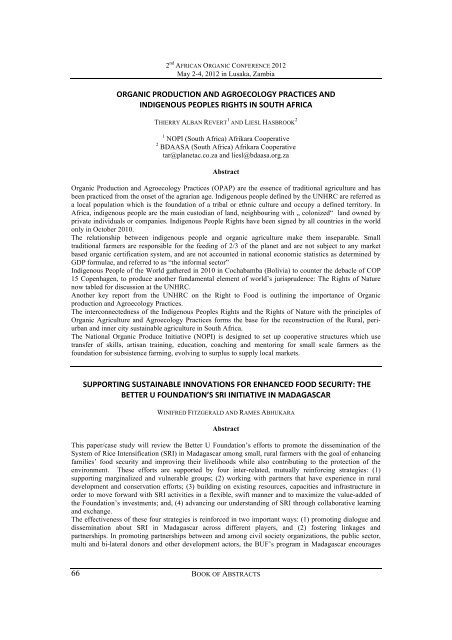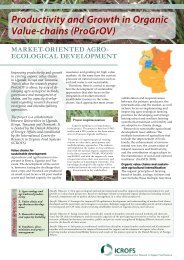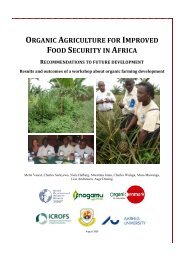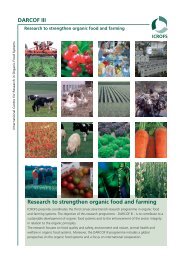The 2nd African Organic Conference â Mainstreaming ... - ICROFS
The 2nd African Organic Conference â Mainstreaming ... - ICROFS
The 2nd African Organic Conference â Mainstreaming ... - ICROFS
You also want an ePaper? Increase the reach of your titles
YUMPU automatically turns print PDFs into web optimized ePapers that Google loves.
2 nd AFRICAN ORGANIC CONFERENCE 2012<br />
May 2-4, 2012 in Lusaka, Zambia<br />
ORGANIC&PRODUCTION&AND&AGROECOLOGY&PRACTICES&AND&&<br />
INDIGENOUS&PEOPLES&RIGHTS&IN&SOUTH&AFRICA&&&<br />
THIERRY ALBAN REVERT 1 AND LIESL HASBROOK 2<br />
1 NOPI (South Africa) Afrikara Cooperative<br />
2 BDAASA (South Africa) Afrikara Cooperative<br />
tar@planetac.co.za and liesl@bdaasa.org.za<br />
Abstract<br />
<strong>Organic</strong> Production and Agroecology Practices (OPAP) are the essence of traditional agriculture and has<br />
been practiced from the onset of the agrarian age. Indigenous people defined by the UNHRC are referred as<br />
a local population which is the foundation of a tribal or ethnic culture and occupy a defined territory. In<br />
Africa, indigenous people are the main custodian of land, neighbouring with „ colonized“ land owned by<br />
private individuals or companies. Indigenous People Rights have been signed by all countries in the world<br />
only in October 2010.<br />
<strong>The</strong> relationship between indigenous people and organic agriculture make them inseparable. Small<br />
traditional farmers are responsible for the feeding of 2/3 of the planet and are not subject to any market<br />
based organic certification system, and are not accounted in national economic statistics as determined by<br />
GDP formulae, and referred to as “the informal sector”<br />
Indigenous People of the World gathered in 2010 in Cochabamba (Bolivia) to counter the debacle of COP<br />
15 Copenhagen, to produce another fundamental element of world’s jurisprudence: <strong>The</strong> Rights of Nature<br />
now tabled for discussion at the UNHRC.<br />
Another key report from the UNHRC on the Right to Food is outlining the importance of <strong>Organic</strong><br />
production and Agroecology Practices.<br />
<strong>The</strong> interconnectedness of the Indigenous Peoples Rights and the Rights of Nature with the principles of<br />
<strong>Organic</strong> Agriculture and Agroecology Practices forms the base for the reconstruction of the Rural, periurban<br />
and inner city sustainable agriculture in South Africa.<br />
<strong>The</strong> National <strong>Organic</strong> Produce Initiative (NOPI) is designed to set up cooperative structures which use<br />
transfer of skills, artisan training, education, coaching and mentoring for small scale farmers as the<br />
foundation for subsistence farming, evolving to surplus to supply local markets.<br />
&SUPPORTING&SUSTAINABLE&INNOVATIONS&FOR&ENHANCED&FOOD&SECURITY:&THE&<br />
BETTER&U&FOUNDATION’S&SRI&INITIATIVE&IN&MADAGASCAR&<br />
WINIFRED FITZGERALD AND RAMES ABHUKARA<br />
Abstract<br />
This paper/case study will review the Better U Foundation’s efforts to promote the dissemination of the<br />
System of Rice Intensification (SRI) in Madagascar among small, rural farmers with the goal of enhancing<br />
families’ food security and improving their livelihoods while also contributing to the protection of the<br />
environment. <strong>The</strong>se efforts are supported by four inter-related, mutually reinforcing strategies: (1)<br />
supporting marginalized and vulnerable groups; (2) working with partners that have experience in rural<br />
development and conservation efforts; (3) building on existing resources, capacities and infrastructure in<br />
order to move forward with SRI activities in a flexible, swift manner and to maximize the value-added of<br />
the Foundation’s investments; and, (4) advancing our understanding of SRI through collaborative learning<br />
and exchange.<br />
<strong>The</strong> effectiveness of these four strategies is reinforced in two important ways: (1) promoting dialogue and<br />
dissemination about SRI in Madagascar across different players, and (2) fostering linkages and<br />
partnerships. In promoting partnerships between and among civil society organizations, the public sector,<br />
multi and bi-lateral donors and other development actors, the BUF’s program in Madagascar encourages<br />
66<br />
BOOK OF ABSTRACTS





